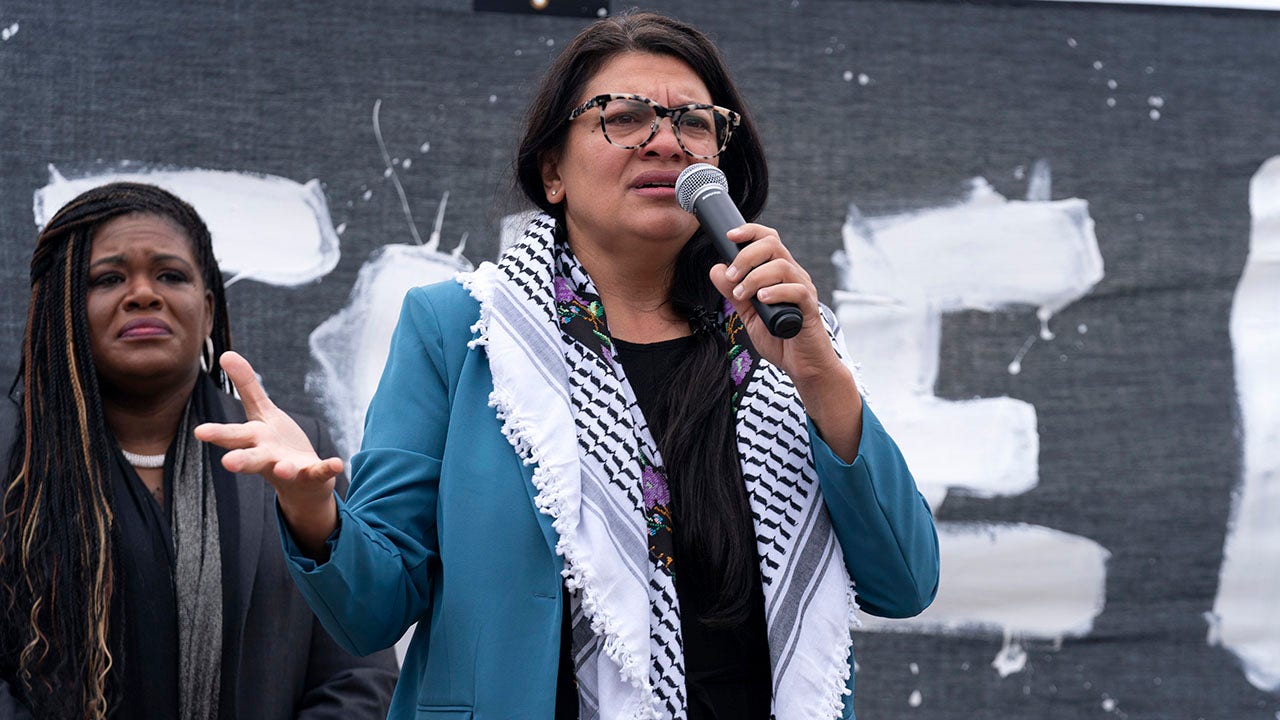World
UN warns Sudan paramilitary forces are encircling a capital in western Darfur, urges against attack
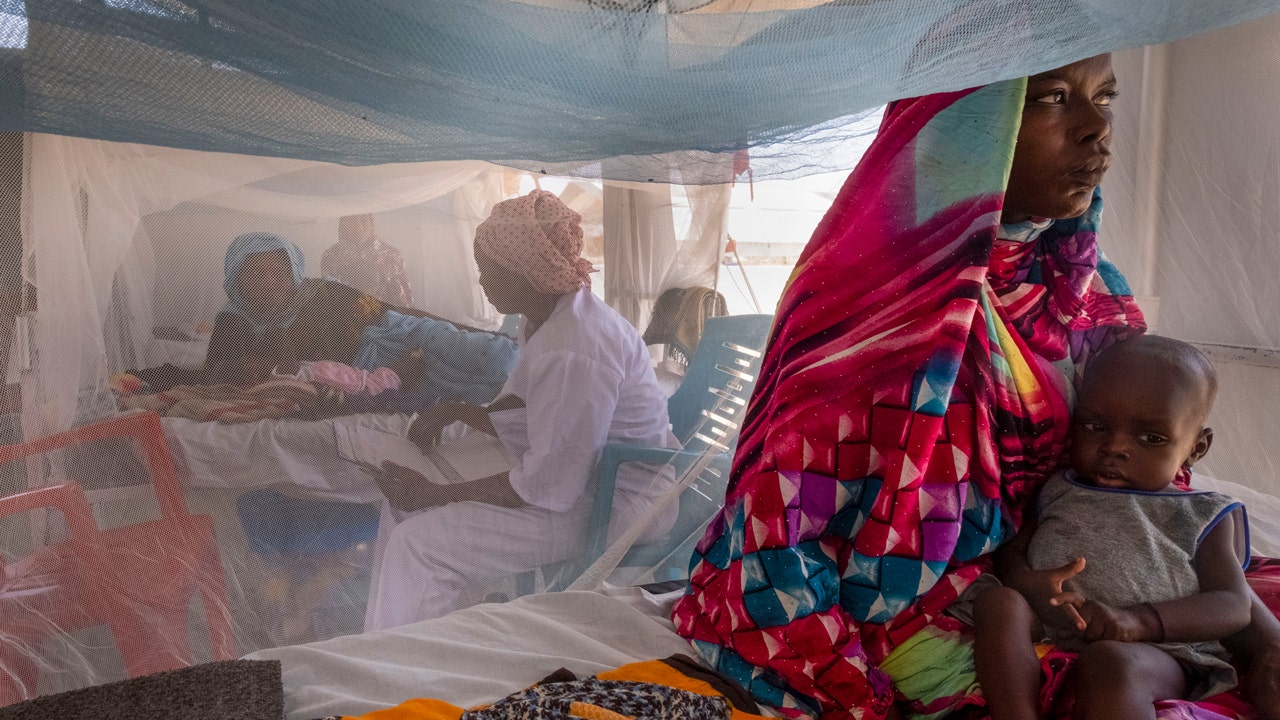
Sudanese paramilitary forces are encircling the only capital they haven’t captured in the western Darfur region, the United Nations said Friday, warning that an attack would have “devastating consequences” for the city’s 800,000 inhabitants.
At the same time, the U.N. said, the rival Sudanese Armed Forces “appear to be positioning themselves.”
SUDAN CONFLICT SPREADS TO KEY HUMANITARIAN SAFE HAVEN
U.N. Secretary-General António Guterres again called on the paramilitary Rapid Support Forces and government forces to refrain from fighting in the North Darfur area around its capital, El Fasher, U.N. spokesman Stephane Dujarric said.
The year-old war in Sudan between rival generals from the paramilitary and government forces who are vying for power has sparked “a crisis of epic proportions,” U.N. political chief Rosemary DiCarlo said last Friday. It has been fueled by weapons from foreign supporters who continue to flout U.N. sanctions aimed at helping end the conflict, she said, stressing that “This is illegal, it is immoral, and it must stop.”
Sudanese children suffering from malnutrition are treated at an MSF clinic in Metche Camp, Chad, near the Sudanese border, April 6, 2024. Many people here fled the fighting in Sudan’s vast western region of Darfur, where attacks by the Arab-dominated Rapid Support Forces on ethnic African civilians have revived memories of genocide. Sudanese paramilitary forces are encircling the only capital they haven’t captured in the western Darfur region, the United Nations said Friday, April 26, warning that an attack would have “devastating consequences” for the city’s 800,000 inhabitants. (AP Photo/Patricia Simon)
The U.N. humanitarian office said Friday that escalating tensions and clashes around El Fasher over the last two weeks have already resulted in the displacement of 40,000 people, as well as a number of civilian casualties.
“The security situation has effectively cut off humanitarian access to El Fasher,” the Office for the Coordination of Humanitarian Affairs known as OCHA, said.
According to humanitarian officials, El Fasher is an important location to reach other parts of the vast Darfur region, including for aid shipments from neighboring Chad and via a northern route from Port Sudan on Sudan’s northeast coast.
“Currently, more than a dozen trucks with life-saving supplies for 122,000 people are stranded in Ad Dabbah in neighboring Northern State, as they cannot move onward to El Fasher due to insecurity and lack of guarantees for safe passage,” OCHA said.
Dujarric said the secretary-general’s personal envoy for Sudan, Ramtane Lamamra, is engaging with the rival parties to de-escalate tensions, which are reported to have dramatically escalated.
OCHA also said it’s “imperative that the parties allow safe passage for civilians to leave El Fasher for safer areas.”
Sudan plunged into chaos in mid-April 2023, when long-simmering tensions between its military, led by Gen. Abdel Fattah Burhan, and the Rapid Support Forces paramilitary commanded by Mohammed Hamdan Dagalo broke out into street battles in the capital, Khartoum. Fighting has spread to other parts of the country, especially urban areas and the western Darfur region.
The U.N.’s DiCarlo painted a dire picture of the war’s impact — over 14,000 dead, tens of thousands wounded, looming famine with 25 million people in need of life-saving assistance, and over 8.6 million forced to flee their homes.
During the war, the Arab-dominated Rapid Support Forces have carried out brutal attacks in Darfur on ethnic African civilians, especially the ethnic Masalit, and have taken control of most of the vast region – with El Fasher its newest target.
Two decades ago, Darfur became synonymous with genocide and war crimes, particularly by the notorious Janjaweed Arab militias, against populations that identify as Central or East African.
That legacy appears to have returned, with the International Criminal Court’s prosecutor, Karim Khan, saying in late January there are grounds to believe both sides may be committing war crimes, crimes against humanity or genocide in Darfur.
The Rapid Support Forces were formed from Janjaweed fighters by former Sudanese President Omar al-Bashir, who ruled the country for three decades before being overthrown during a popular uprising in 2019. He is wanted by the International Criminal Court on charges of genocide and other crimes during the conflict in Darfur in the 2000s.

World
Trump seeks records about evidence handling in latest bid to delay documents case

World
Temporary floating pier for Gaza aid completed, will move into position once weather lets up: Pentagon
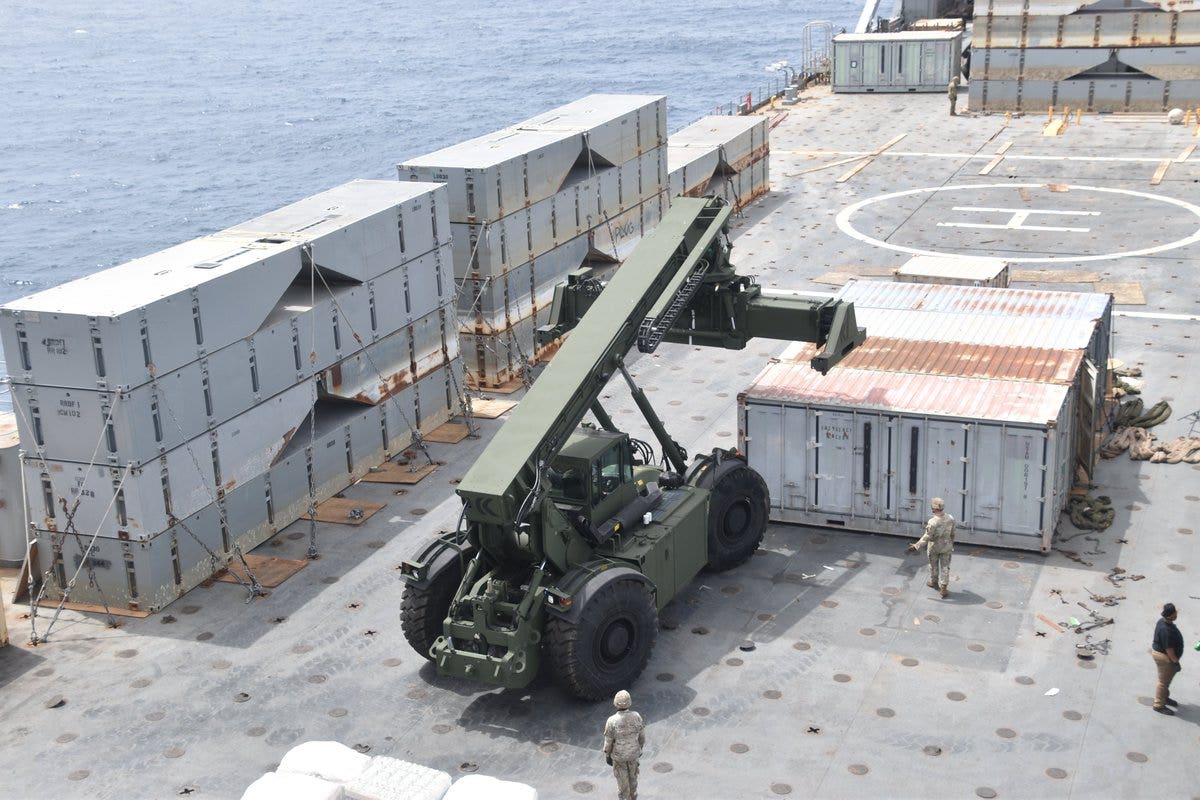
Both sections of the temporary floating pier intended to be placed off the coast of Gaza Strip for the delivery of humanitarian aid have been completed, though weather and sea conditions are preventing delivery of the parts to the embattled region, Pentagon officials tell Fox News.
Pentagon Deputy Press Secretary Sabrina Singh said during a press briefing on Tuesday that the U.S. Military completed the offshore construction of the Trident Pier section, or the causeway, which is the component that will eventually be anchored to the Gaza shore.
The second element of the project, the floating pier section, has also been completed.
“So, as of today, the construction of the two portions of the JLOTS [Joint Logistics Over-the-Shore], the floating pier and the Trident pier are complete and awaiting final movement offshore,” Singh said. “As you know, late last week, CENTCOM [U.S. Central Command] temporarily paused moving the floating pier and Trident pier toward the vicinity of Gaza due to sea state conditions. Today, there are still forecasted high winds and high sea swells, which are causing unsafe conditions for the JLOTS [Joint Logistics Over-The-Shore] components to be moved.”
MORE AID IS SUPPOSED TO BE ENTERING THE GAZA STRIP. WHY ISN’T IT HELPING?
U.S. Central Command tweeted that the construction of the floating Joint Logistics Over-The-Shore pier in the Mediterranean is underway. (CENTCOM)
The components are still sitting at the Port of Ashdod, and CENTCOM “stands by” to relocate the pier sections to Gaza, Singh added.
Once off the coast of Gaza, the U.S. military and USAID will work together to deliver humanitarian assistance using military support vessels and trucks.
Singh could not provide an exact date for when the pier would be maneuvered into place, mainly because of the weather and security conditions.
“As CENTCOM stands by to move the pier into position in the near future, and again, in partnership with USAID, we’re loading humanitarian aid onto the MV Sagamore, which is currently in Cyprus,” she said. “The Sagamore is a cargo vessel that will use the JLOTS system and will make trips between Cyprus and the offshore floating pier, as USAID and other partners collect aid from around the world.”
GROWING CONTROVERSY OVER BIDEN’S GAZA PIER FUELS CONCERNS OVER COST, SECURITY
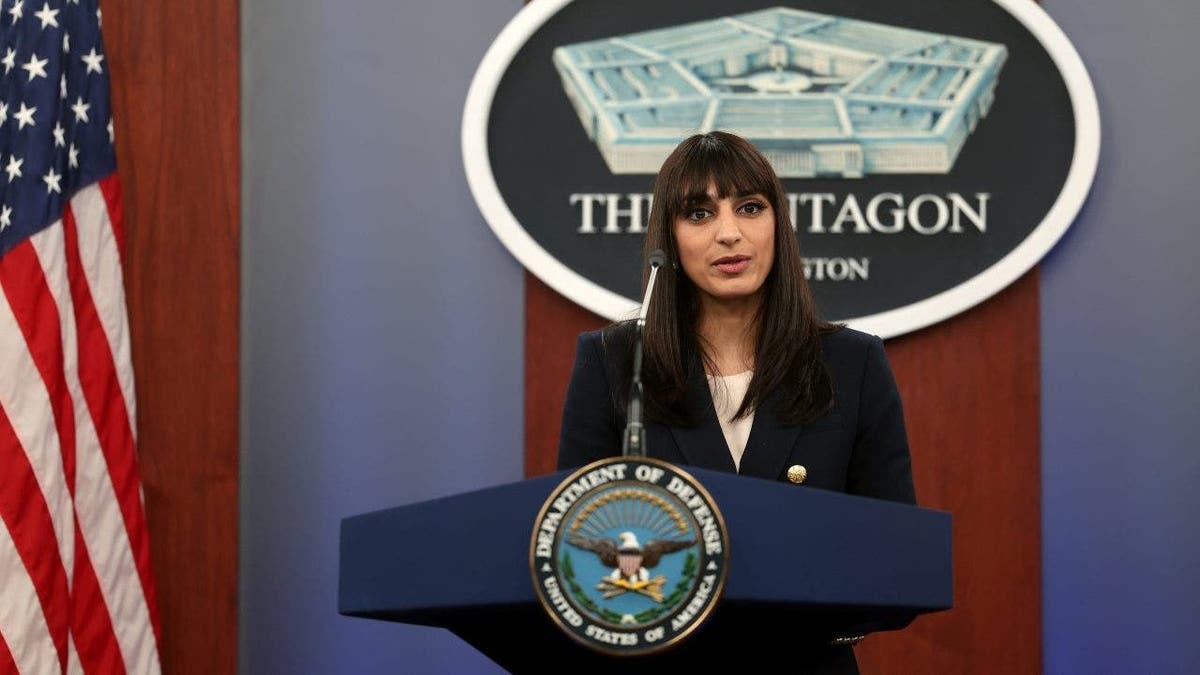
Pentagon Deputy spokesperson Sabrina Singh holds a press briefing at the Pentagon in Arlington, Va. (Kevin Dietsch/Getty Images)
The unloading of the aid will be, as she called it, a “crawl, walk, run scenario.”
Once fully operational, 150 trucks will be available to move aid into Gaza. At first, though, a small number of trucks will be used to make sure the distribution system works.
BIDEN’S VISION FOR A PALESTINIAN STATE DOOMED, EXPERTS SAY: ‘AN EXPLICIT RECOGNITION OF HAMAS’
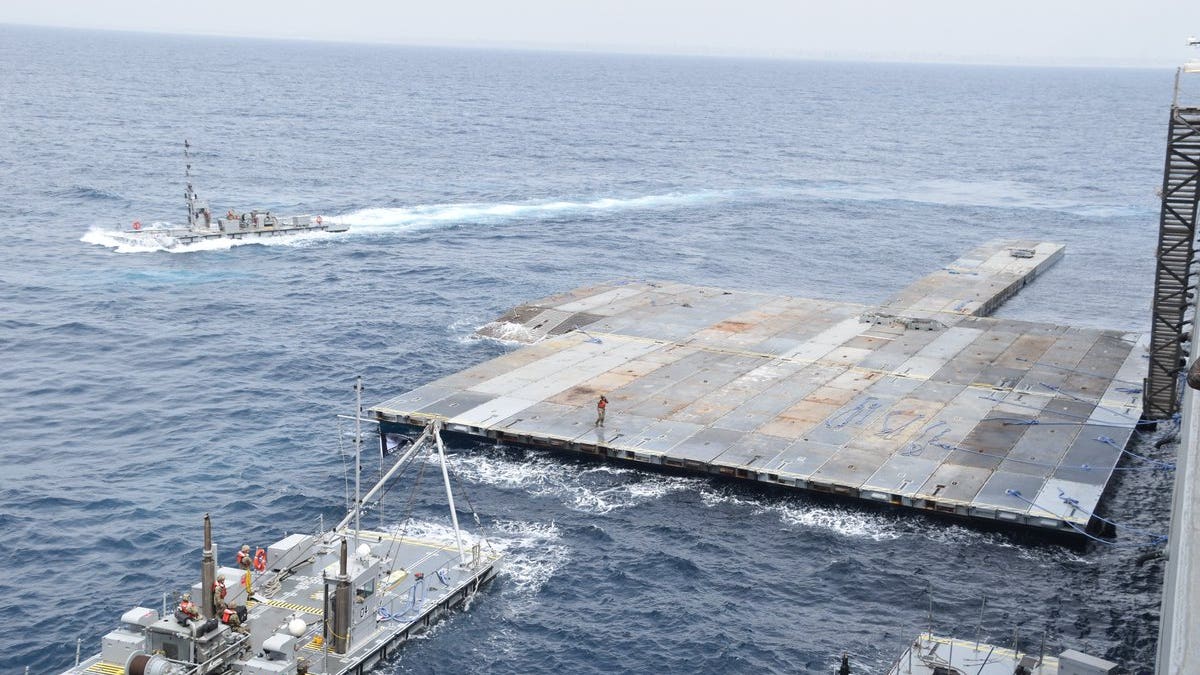
CENTCOM tweeted on X that, ‘The pier will support @USAID and humanitarian partners to receive and deliver humanitarian aid to the people of Gaza. @USTRANSCOM and @USEUCOM support the movement of #humanitarianaid. (CENTCOM)
Last week, U.S. Central Command posted photographs on X of the pier under construction by U.S. soldiers in the Mediterranean Sea, saying that the hulking metal platform “will support USAID and other humanitarian partners who will receive and deliver humanitarian aid to the people of Gaza.”
The Pentagon has said the estimated cost would nearly double the original estimate of $180 million. It also said the project will only be in use temporarily, for a period of three months.
The pier will be able to process up to two million meals a day for the people in Gaza, U.S. Central Command said.
Ruth Marks Eglash of Fox News contributed to this report.
World
‘Bleak milestone’: UN says 3 million forced to flee in Myanmar conflict

United Nations says the number displaced has jumped by 50 percent in last six months as fighting has intensified.
The number of people in Myanmar forced from their homes by conflict now exceeds more than 3 million in what the United Nations has described as a “bleak milestone” for the country.
The UN said the number displaced had surged by 50 percent in the last six months as fighting escalated between the military and armed groups trying to remove the generals who seized power in a coup in February 2021.
“Myanmar has this week marked a bleak milestone with more than 3 million civilians now displaced nationwide amid intensifying conflict,” the office of the UN Resident and Humanitarian Coordinator for Myanmar said in a statement on Monday.
“Myanmar stands at the precipice in 2024 with a deepening humanitarian crisis that has spiraled since the military takeover in February 2021 and the consequent conflicts in many parts of the country, driving record numbers of people to abandon their homes seeking safety.”
Of the 3 million internally displaced people, more than 90 percent fled as a result of the conflict triggered by the coup, the UN added.
About half of the displaced are in the northwestern regions of Chin, Magway and Sagaing, with more than 900,000 in the southeast. About 356,000 people live in the western state of Rakhine where a brutal military crackdown in 2017 prompted more than 750,000 mostly Muslim Rohingya to flee into neighbouring Bangladesh.
Myanmar was plunged into crisis when Senior General Min Aung Hlaing seized power from the elected government of Aung San Suu Kyi, which led to mass protests that evolved into an armed uprising when the military responded with brutal force.
Fighting has intensified since the end of October last year when ethnic armed groups allied with anti-coup fighters launched a major offensive in northern Shan and western Rakhine states overrunning dozens of military outposts and taking control of several key towns near the border with China.
In recent weeks, the military has also been battling with ethnic Karen groups for control of Myawaddy, a major trade hub on the border with Thailand.
The UN said the deepening conflict meant that some 18.6 million people in Myanmar were now in need of humanitarian assistance, 1 million more than in 2023.
But it said efforts to reach those in need were being hampered by “gross underfunding”. It said it had so far received less than 5 percent of the funds it needed for humanitarian operations.
“With cyclone season fast approaching, additional resources are needed now to protect the most vulnerable and save lives,” the statement said.
Last year, UN human rights chief Volker Turk accused the military of preventing life-saving humanitarian aid from reaching people in need by creating a web of legal, bureaucratic and financial hurdles.
The generals, who have been accused of launching air attacks on civilians and burning villages to the ground, have ignored a five-point peace plan that it agreed to with fellow members of the Association of Southeast Asian Nations (ASEAN) in April 2021, under which it was supposed to end the violence.
Nearly 5,000 people have been killed by the military since the coup, according to the Assistance Association for Political Prisoners, which has been tracking the situation. More than 20,000 people are in detention, while Aung San Suu Kyi is serving a combined 27-year sentence after a secret trial in a military court.
-

 World1 week ago
World1 week agoRussian forces gained partial control of Donetsk's Ocheretyne town
-
Movie Reviews1 week ago
Challengers Movie Review
-
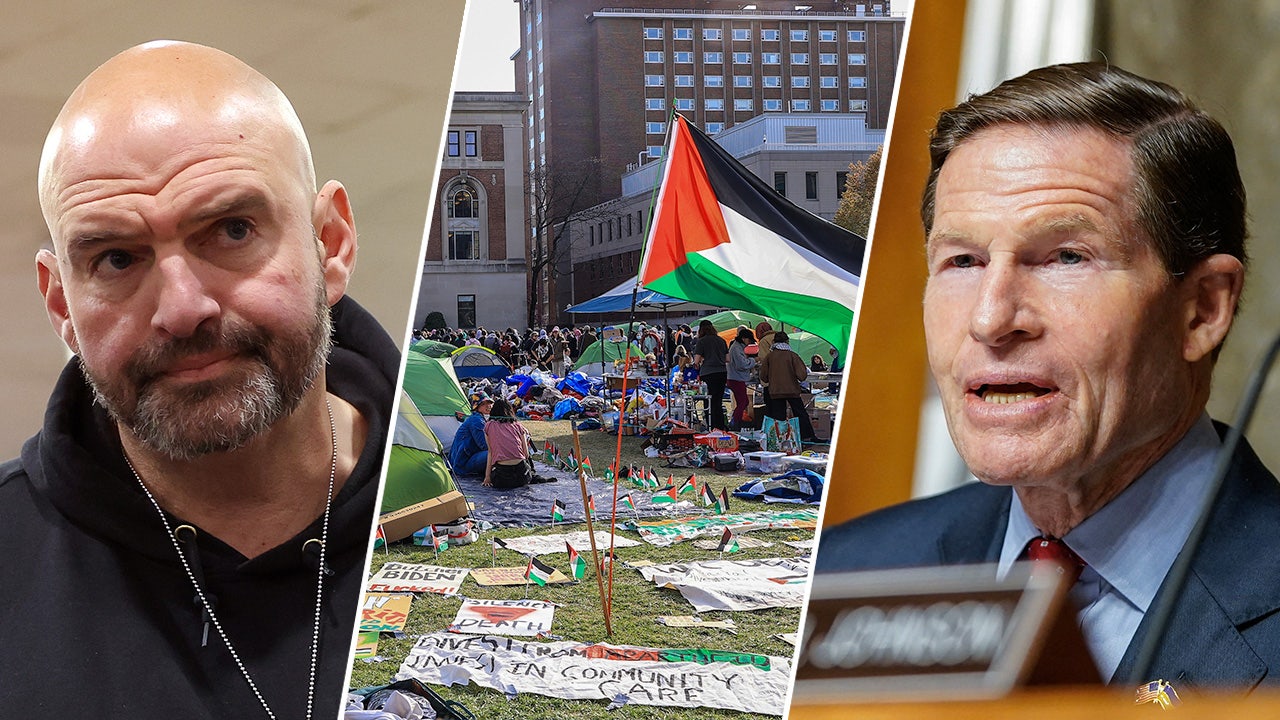
 Politics1 week ago
Politics1 week agoDems disagree on whether party has antisemitism problem
-

 Politics1 week ago
Politics1 week agoHouse Republicans brace for spring legislative sprint with one less GOP vote
-

 World1 week ago
World1 week agoAt least four dead in US after dozens of tornadoes rip through Oklahoma
-

 Politics1 week ago
Politics1 week agoAnti-Trump DA's no-show at debate leaves challenger facing off against empty podium
-

 Politics1 week ago
Politics1 week agoStefanik hits special counsel Jack Smith with ethics complaint, accuses him of election meddling
-

 News1 week ago
News1 week agoAs student protesters get arrested, they risk being banned from campus too











